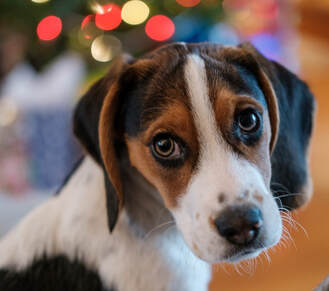Laurie Anne Walden, DVM Photo by Tyler Farmer Photo by Tyler Farmer Holiday celebrations can be stressful for pets. Visitors, changes in routine, changes in food, unfamiliar scents and objects in the home, traveling, and noise can all cause anxiety for animals. Animals are more likely to bite when they’re scared or anxious, so minimizing sources of stress for your pets will help keep the holidays happy for everyone. Limit Stressful Situations To identify sources of stress for your pets, think like an animal. Animals feel safest when their routines and environment are predictable. Keep meal times, nap times, and exercise and play schedules about the same as usual. You might want to sleep late on a holiday (OK, the day after a holiday), but if your pets are used to a very consistent morning routine, this change could contribute to stress. It’s normal and very human to want to include pets in our celebrations, but be careful not to think of your animals as little people in fur (or scale or feather) coats. They won’t feel left out if they’re not invited to a party. Most animals would rather be in a nice quiet room than in the middle of holiday hubbub. Think about your pets’ usual behavior around strangers and noise, and let them stay wherever they are most comfortable and safe. Be aware of foods that aren’t safe for animals, especially if you have visitors who don’t know what your pets should and shouldn’t eat. Chocolate, xylitol sweetener, grapes, raisins, onion, garlic, and raw yeast dough are some of the foods that can be dangerous for animals. Limit or avoid table food for your pets; fatty or rich food can cause digestive upset. A holiday trip to the emergency veterinary clinic is not on anyone’s wish list. Contact your veterinarian in advance if your pet is afraid of fireworks or has travel anxiety. Your veterinarian might recommend prescription or nonprescription antianxiety medication, depending on the symptoms. Plan ahead for this. Your pet might need a veterinary examination before medication can be prescribed. Watch for Signs of Stress The early signs of fear and anxiety can be subtle. Owners sometimes don’t realize their pets are in distress until the behavior escalates to aggression (an attempt to remove a perceived threat). Watch for any changes from the usual behavior. Some animals withdraw and hide in response to stress; others become hyperactive or clingy. Signs of Anxiety in Dogs
Signs of Anxiety in Cats
Photo by Tyler Farmer on Unsplash Comments are closed.
|
AuthorLaurie Anne Walden, DVM Categories
All
Archives
June 2024
The contents of this blog are for information only and should not substitute for advice from a veterinarian who has examined the animal. All blog content is copyrighted by Mallard Creek Animal Hospital and may not be copied, reproduced, transmitted, or distributed without permission.
|
- Home
- About
- Our Services
- Our Team
-
Client Education Center
- AKC: Spaying and Neutering your Puppy
- Animal Poison Control
- ASPCA Poisonous Plants
- AVMA: Spaying and Neutering your pet
- Biting Puppies
- Boarding Your Dog
- Caring for the Senior Cat
- Cats and Claws
- FDA warning - Bone treats
- Force Free Alliance of Charlotte Trainers
- Getting your Cat to the Vet - AAFP
- Holiday Hazards
- How To Feed Cats for Good Health
- How to Get the Most Out of your Annual Exam
- Indoor Cat Initiative - OSU
- Introducing Your Dog to Your Baby
- Moving Your Cat to a New Home
- Muzzle Training
- Osteoarthritis Checklist for Cats
- What To Do When You Find a Stray
- Our Online Store
- Dr. Walden's Blog
- Client Center
- Contact
- Cat Enrichment Month 2024
|
Office Hours
Monday through Friday 7:30 am to 6:00 pm
|
Mallard Creek Animal Hospital
2110 Ben Craig Dr. Suite 100
|
Site powered by Weebly. Managed by IDEXX Laboratories

 RSS Feed
RSS Feed